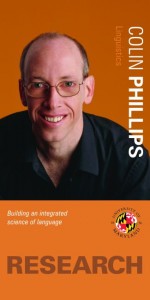Source: University of Maryland Language Science Center.
“The National Science Foundation has announced that the University of Maryland’s Language Science Center (LSC) will (again!) receive a $3M grant for innovative research and graduate training, this time as part of the first cohort of awards made through its new NSF Research Traineeship (NRT) program. This 5-year award will support a model of interdisciplinary graduate training that prepares students to be adaptable scientists in multiple settings and career paths. The project will connect research on humans and machines, via a focus on how to succeed when Big Data is not available. The project is led by faculty and students from 10 departments across the entire university.”
“I’m excited by the research theme, which takes a “Beyond Big Data” approach,” says Colin Phillips, program PI and LSC Director. “We’re interested in how humans and machines can learn more efficiently from ‘multi-scale data’. Everybody’s talking these days about Big Data, but the current frontier in language science involves how to do more with less, you could call it ‘medium data’ or ‘small data’. It’s important for building better language technology, and it’s important for improving language learning outcomes in children and adults. Current language technologies like Google Translate and Apple’s Siri rely on a Big Data approach that stores billions of utterances. But that approach won’t generalize to the vast majority of the world’s 7000 languages. And human children easily outperform the best current technology, though they learn language from far less data. Child brains somehow learn the language around them more efficiently. But we all know that learning a new language as an adult is much harder. And we’re learning more and more about how children who experience ‘language poverty’, growing up with smaller amounts of quality language interaction, face negative consequences that last a lifetime. We want to understand why some learners fare better than others.” A key venue for exploring the program’s research goals will be yearly “Summer Camps”, intensive research-only workshops that will bring together students and faculty from UMD and beyond.”
Colin Phillips video.

